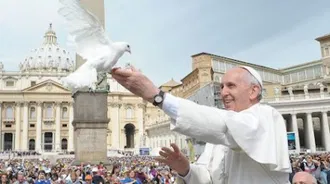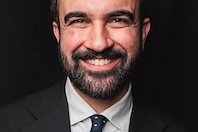Ian Linden: The Pope, Genocide & the War in Gaza

Pope with peace dove - Image Vatican Media
On Sunday, the Italian daily La Stampa quoted Pope Francis, in excerpts taken from a book shortly to be published, saying that some international experts have declared that "what is happening in Gaza has the characteristics of a genocide". "We should investigate carefully to assess whether this fits into the technical definition (of genocide) formulated by international jurists and organisations," the Pope urged.
These remarks will, without doubt, have caused distress in Israel and in Jewish communities around the world with whom the Pope has worked to have better relationships. Francis visited the tomb of Theodor Herzl, the father of modern political Zionism in 2014, Auschwitz in 2016, and expressed concern about growing antisemitism on Italian television in November 2023. But tensions have been growing as the Israel-Palestine conflict escalated with religious affiliation becoming more significant. The Vatican's attempt to achieve a balance between Islam and Judaism has become more challenging.
Last December, to some degree South Africa pre-empted the Pope's call, filing a complaint, a 'Memorial', in the International Court of Justice (ICJ) against Israel for its actions in Gaza. The Genocide Convention was adopted by the UN in December 1948 as a response to the Holocaust. Alleging that a Jewish State needed to be prevented from committing the crime of genocide is particularly shocking.
The Pope is seeking clarification on whether the Convention is applicable to the situation in Gaza. So, on what grounds did South Africa institute such legal proceedings in the ICJ? There are certain international Conventions which "all States can be held to have a legal interest in their protection" and thus an obligation to intervene. The Genocide Convention, an international treaty, is one of them. This principle, erga omnes partes (directed at all parties), was endorsed by the ICJ in 2022 in a case of Gambia v Myanmar involving the plight of the Rohingya. In approaching the ICJ South Africa found legal means and precedent to express its solidarity with Palestinians.
In international law the definition of the crime of genocide is highly restrictive. Nonetheless, thirteen other States, including Spain, Mexico, Ireland and Belgium, have indicated their intention of intervening on the side of South Africa at the ICJ with their own 'Memorials'.
A look at how genocide became a crime recognised in international law sheds some light on the difficulty of establishing it legally today. The Polish, Jewish lawyer, Raphael Lemkin, coined the term 'genocide' in late 1942 in the context of Axis rule in occupied Europe: a process of destruction of an oppressed group "after removal of the population and the colonisation of the area by the oppressor's own nationals". He struggled to define the term but was clear about its historical precedents. "Bartolomé de las Casas, Vitoria [16th century Salamanca Dominican Friars who championed rights of indigenous peoples], and humanitarian interventions, are all links in one chain leading to the proclamation of genocide as an international crime by the United Nations", he wrote in a later unpublished essay.
By the end of World War II, the crime of genocide was still not fully defined but the prosecutors in the International Military Tribunal in Nuremberg (1945-1946) did not flinch from using the term. Though none of the convicted Nazi leaders were found guilty of genocide as a specific crime. The Nuremberg indictments were for one or more crimes notably 'war against peace' (waging aggressive war), war crimes and crimes against humanity - which covered genocide. At the time, Lemkin was defining genocide as "the criminal intent to destroy or cripple a human group" with an added emphasis on the destruction of cultures and their loss to humanity. His focus then was on the destruction of racial and national groups citing the fate of Poles, Gypsies and Jews.
In a resolution in the September 1948 session of the United Nations, the General Assembly declared that genocide was a crime that could take place in peacetime. In December 1948 the Convention defined genocide in Article II as: "a crime committed with the intent to destroy a national, ethnical sic, racial or religious group, in whole or in part". Because of the imperial sensitivities of UN member States, Lemkin's emphasis on the destruction of cultures had disappeared, nor were political groups included.
On 8 October, the BBC led on an update report from the UN's Independent International Commission of Inquiry on the Occupied Palestinian Territory set up in 2021 by the UN Human Rights Council. The Israeli Defence Forces (IDF) had not allowed them into Gaza. The UN team of three brought considerable combined experience to a difficult task. Members were South African Navi Pillay, former President Judge of the International Criminal Tribunal for Rwanda, Miloon Kothari, a former convener of the Working Group on Human Rights in India and the UN, and Professor Chris Sidoti, an academic expert on international human rights law and formerly Australian Human Rights Commissioner and head of the Australian Justice and Peace Commission.. Their report highlighted both Israel's actions and those occurring during Hamas' terrible 7 October attack when 1,200 Israelis died, 40 children killed, and hundreds were wounded. At the Nova music festival alone 136 women were slaughtered and there were incidents of sexual violence. 251 hostages were taken.
The UN Human Rights Office has examined over 8,000 deaths in Gaza from the beginning of the war. Requiring three sources for each verification of death - for that reason mostly inside residential buildings - the Human Rights Office found 44% were children, 26% women and 30% men. Assuming for every direct killing four indirect deaths because of the war, The Lancet estimate some 190,000 Palestinians have died. In the words of the Austrian diplomat and High Commissioner for Human Rights, Volker Türk, "unprecedented levels of killing, death, injury, starvation, illness and disease".
Overall, the figures support allegations of indiscriminate bombing and shelling and appear incompatible with Israel's claimed policy of legitimate self-defence: ending terrorism by targeted attacks on Hamas belligerents. An action cited by Article II as genocidal in the Convention, and relevant when considering the war, is "deliberately inflicting on the group conditions of life calculated to bring about its physical destruction in whole or in part".
Under Article III of the Genocide Convention, direct and public incitement to commit genocide is legally punishable whether or not it results in actual genocidal action. On 28 December 2023, in a letter to Israel's Attorney General, a group of former Knesset members, Israeli diplomats, academics and journalists gave details of "extensive and blatant incitement to genocide' by influential Israeli public figures and called for their prosecution. The most significant calls had come from Itamar Ben-Gvir, Minister of National Security, who declared those who "celebrate, those who support.... they're all terrorists and they should also be destroyed", and from former Minister of Defence, Yoav Gallant, who said Israel was fighting "human animals" and that he was "imposing a complete siege on Gaza. There will be no electricity, no food, no water, no fuel".
In a statement on 28 October 2023 on war against Hamas, Prime Minister Netanyahu himself urged Israelis to remember their biblical enemy Amalek citing Deuteronomy 25.17. Samuel 15.3 on the Amelekites reads: "Do not spare them; put to death men and women, children and infants..." Emotional rhetoric after the security failure and the tragic losses and hostage-taking of 7 October, or incitement and indications of intent? This is the kind of material jurists consider.
To read on see: www.ianlinden.com/latest-blogs/the-pope-genocide-the-war-in-gaza
Professor Ian Linden is Visiting Professor at St Mary's University, Strawberry Hill, London. A past director of the Catholic Institute for International Relations, he was awarded a CMG for his work for human rights in 2000. He has also been an adviser on Europe and Justice and Peace issues to the Department of International Affairs of the Catholic Bishops Conference of England and Wales. Ian chairs a new charity for After-school schooling in Beirut for Syrian refugees and Lebanese kids in danger of dropping out partnering with CARITAS Lebanon and work on board of Las Casas Institute in Oxford with Richard Finn OP. His latest book was Global Catholicism published by Hurst in 2009.


















